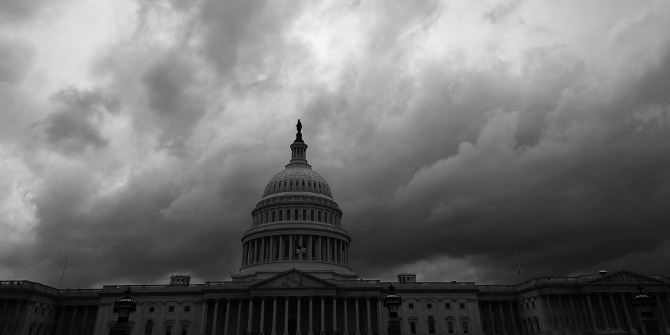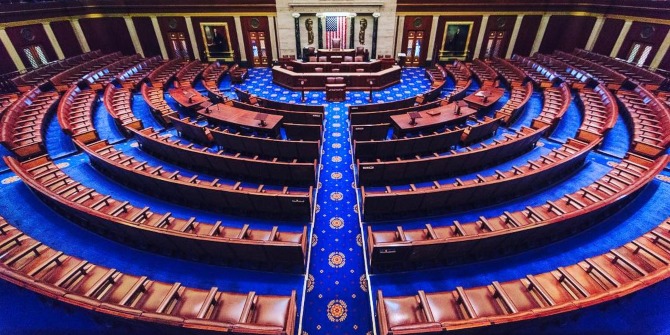
 President Joe Biden has recently advocated for changing the Democratic presidential primary calendar by moving the South Carolina primary to the first position ahead of the New Hampshire primary and Iowa’s caucuses. Caitlin Jewitt and Gregory Shufeldt write that while Biden’s proposals would give more diverse electorates a greater voice earlier in the presidential primary process, they face three obstacles: state governments may not agree to change the timing of their primaries, Republican opposition to the plans, and potential political tension between 2024 Democratic presidential candidates.
President Joe Biden has recently advocated for changing the Democratic presidential primary calendar by moving the South Carolina primary to the first position ahead of the New Hampshire primary and Iowa’s caucuses. Caitlin Jewitt and Gregory Shufeldt write that while Biden’s proposals would give more diverse electorates a greater voice earlier in the presidential primary process, they face three obstacles: state governments may not agree to change the timing of their primaries, Republican opposition to the plans, and potential political tension between 2024 Democratic presidential candidates.
Following a lengthy process by the Democratic National Committee’s Rules and Bylaws Committee to reevaluate the schedule of its presidential primaries and caucuses, President Biden recently advocated for the South Carolina primary to occupy the coveted first position in place of the Iowa caucuses and New Hampshire primary, elevating the voices of African American voters.
South Carolina would be followed by the New Hampshire and Nevada primaries held on the same date, then the Georgia and Michigan primaries. This proposal would remove the Iowa caucuses from the early period altogether.
Why the timing of presidential primaries matters
The timing and order of the primaries matters because presidential nominations are unlike other US elections. These intra-party events take place over the course of several months, typically from February through June in a presidential election year. Within national party guidelines, states can implement their own rules, such as the type (primary or caucus) and date of their contest.
Holding an early contest is seen as advantageous for several reasons, as candidate and media attention and corresponding economic benefits are directed at these early states. Early states also tend to be more influential in the nomination process because their results affect the candidates’ fortunes, polling numbers, fundraising ability, and decisions to withdraw from the race.
In recent years, both national parties have allowed four states: Iowa, New Hampshire, South Carolina, and Nevada to vote early, before other states are allowed to hold their contests. Iowa has long held the first caucus and New Hampshire the first primary. There have long been calls to modify the early portion of the calendar, typically focused on criticisms of the lack of diversity in Iowa and New Hampshire’s electorates. South Carolina and Nevada were added to the early line up prior to the 2008 nomination to diversify the early contests.
These demands were exacerbated in 2020 by two factors. First, there were problems with the vote counting and reporting in the Iowa caucuses. Second, President Biden resurrected his campaign, following poor performances in Iowa and New Hampshire, with a critical win in South Carolina, demonstrating his appeal to a diverse electorate.
The hurdles facing Biden’s primary proposals
With President Biden’s support, this proposal has already been approved by the DNC’s Rules and Bylaws Committee. If the full Democratic National Committee approves this plan in February, we see at least three clear meaningful hurdles.
First, the presidential primary is a series of sequential elections conducted and administered by the states. Just because the national party establishes a plan, that does not guarantee that state governments will follow or acquiesce. At various times, the parties have offered bonus delegates to states willing to hold contests later in the nomination season, tied the allowable delegate allocation rule to the timing of the contest, and punished states that broke the rules by decreasing the number of delegates the state has at the National Convention. In 2008, Florida and Michigan scheduled earlier than permitted contests and the DNC responded by stripping these states of their delegates, only to reinstate a portion of their delegations as the race between Obama and Clinton tightened.
These strategies have been largely ineffective. States have often come to the conclusion that the benefits derived from an early primary exceed the punishment imposed by the national party. This may be especially true for states that have a small number of delegates. For instance, New Hampshire’s sizable influence has come from its position in the calendar, not from the size of its relatively small delegation. New Hampshire has already indicated that it does not intend to abide by the new Democratic calendar and that it will follow its state law, mandating it hold the first primary.

“P20220929AS-0043“by The White House is United States government work.
The second clear hurdle is that Republicans have indicated they intend to retain their current order of Iowa, New Hampshire, South Carolina, and Nevada. Most states currently hold their Republican and Democratic contests on the same day. In 2016, 11 states and the District of Columbia held their partisan contests on different days. This proposal would further increase that number in these key early states.
It is more cost effective for states to have a singular primary day – rather than separate contests for Democrats and Republicans. In fact, costs and avoiding duplication is one reason why many states choose to hold their contests later in the year, aligning their presidential primary with their primaries for other state and federal offices. State legislatures, especially those controlled by Republicans, may not feel the need to schedule and incur an additional election cost to abide by Democratic directives.
The final obstacle is the likely political tension between potential candidates and the goals of the party. If President Biden runs for re-election in 2024, much of this is moot for the Democrats. But in an open race, the most effective way to ensure that the states adhere to the national party’s desired calendar is by finding a way to keep candidates from campaigning in states that break the rules and schedule early contests. A candidate such as Secretary of Transportation Pete Buttigieg may be advantaged by campaigning in early rule-breaking states, such as Iowa and New Hampshire, to earn momentum and media attention, rather than focusing his resources on South Carolina, where a candidate like Vice-President Kamala Harris would be expected to do well.
President Biden has also recommended that the calendar be reevaluated every four years. Thus, potentially, the calendar could shift frequently, making it challenging for voters and candidates, especially since the incumbent president has tremendous influence on the nominating rules, as President Biden’s preferences and proposal have illustrated.
- Please read our comments policy before commenting.
- Note: This article gives the views of the author, and not the position of USAPP – American Politics and Policy, nor the London School of Economics.
- Shortened URL for this post: https://bit.ly/3hqlurB






